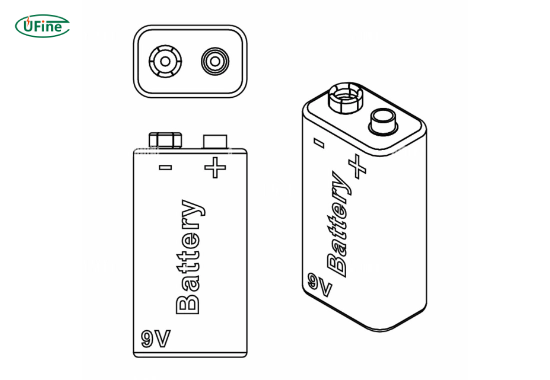When it comes to ensuring the safety of your home, one crucial component is the batteries for fire alarms. These batteries are essential in keeping your smoke detectors operational, providing early warnings in case of fire. In this article, we will explore the differences between 9V and AA batteries, their specific applications in fire alarms, and help you determine the best choice for your safety needs.
Part 1. What are the batteries for fire alarms?
Batteries are the power sources for fire alarms, which keep these critical safety devices functioning. Smoke detectors require a reliable battery to detect smoke and alert occupants of potential danger. The two most common types of batteries used in fire alarms are 9V batteries and AA batteries.
Importance of Battery Choice
Choosing the right battery is vital because it directly affects the performance of your smoke alarm. A reliable battery ensures that your smoke detector works when you need it most. Many overlook this aspect, but understanding the differences between battery types can significantly affect home safety.
Part 2. What are 9V batteries?
9V batteries produce a voltage of nine volts. They are typically rectangular and consist of six smaller cells connected in series. These batteries are commonly used in devices requiring a significant power output but do not continuously consume much energy, such as smoke detectors, remote controls, and specific medical devices.
Advantages of 9V Batteries
- High Power Output: 9V batteries can deliver intense bursts of energy, making them suitable for devices that need quick power.
- Compact Design: Their rectangular shape allows them to fit into smaller spaces, which is beneficial for compact devices like smoke detectors.
- Long Shelf Life: When stored properly, 9V batteries can last several years without losing their charge significantly.
Disadvantages of 9V Batteries
- Shorter Lifespan Under Continuous Use: While they provide high bursts of energy, they may run out faster than AA batteries when used in devices that require consistent power.
- Higher Cost: Generally, 9V batteries are more expensive than AA batteries.
Part 3. What are AA batteries?
AA batteries are cylindrical batteries that produce 1.5 volts each. Due to their versatility and availability, they are widely used across various devices. Most commonly found in household items like toys, remote controls, and flashlights, they can also be used in some smoke detectors.
Advantages of AA Batteries
- Higher Energy Capacity: When multiple AA cells are used together, AA batteries generally have a larger energy capacity than 9V batteries.
- Cost-Effective: They are often cheaper and more readily available than 9V batteries.
- Longer Lifespan in Low-Power Devices: AA batteries can last longer due to their larger capacity in devices that do not require high bursts of energy.
Disadvantages of AA Batteries
- Size Requirement: Devices designed for AA batteries may require more space since multiple cells are needed to achieve the same voltage as a single 9V battery.
- Potential for Leakage: Like all alkaline batteries, AA batteries can leak if left unused for extended periods or over-discharged.
Part 4. Performance comparison: 9V vs AA in fire alarms
When choosing between 9V and AA batteries for fire alarms, it’s essential to understand how they perform differently. Here’s a simple overview:
- Voltage Output: A single 9V battery provides nine volts directly, while three AA batteries are needed to match this voltage.
- Energy Capacity: AA batteries typically have a higher overall capacity when multiple cells are combined compared to a single 9V battery.
- Cost Efficiency: AA batteries are less expensive than their 9V counterparts.
Now, let’s summarize these points in a comparison table:
| Feature | 9V Batteries | AA Batteries |
|---|---|---|
| Voltage | Provides 9 volts | Requires three (3) for equivalent voltage |
| Energy Capacity | Lower overall capacity | Higher overall capacity when combined |
| Cost | Generally more expensive | More cost-effective |
| Lifespan | Shorter lifespan under continuous use | Longer lifespan in low-power applications |
| Size Compatibility | Fits compact designs | Requires more space |
Part 5. Best practices for battery maintenance in fire alarms
To ensure that your fire alarms function correctly, you must follow the best practices for maintaining their batteries:
- Regular Testing: Test your smoke detectors at least once a month. This ensures they are functioning correctly and can alert you in an emergency.
- Battery Replacement Schedule: According to the manufacturer’s recommendations, replace the batteries at least every six months to keep your smoke detector powered at all times.
- Check Expiry Dates: Always check the expiration dates on battery packaging before use. Using expired batteries can compromise the effectiveness of your smoke alarm.
- Clean Smoke Detectors: Dust and debris can accumulate on smoke detectors over time. Gently clean them with a soft cloth or vacuum attachment to ensure they operate effectively.
Part 6. Which battery should you choose?
Choosing between 9V and AA batteries for your fire alarms ultimately depends on your specific needs and preferences. If you prefer a compact design with higher bursts of energy, a 9V battery might be suitable. However, consider using AA batteries if you seek longer-lasting power at a lower cost.
Part 7. FAQs
-
Can I use AA batteries in my smoke detector instead of a 9V battery?
It depends on the design of your smoke detector. Always refer to the manufacturer’s specifications before making substitutions. -
How often should I replace the batteries in my smoke alarm?
It is recommended that the smoke alarm batteries be replaced every six months and tested monthly. -
Are rechargeable options available for these battery types?
Yes, rechargeable 9V and AA batteries are available on the market and can be used in compatible devices. -
What happens if I use an expired battery in my smoke detector?
An expired battery may not provide sufficient power to your smoke detector, potentially compromising its ability to alert you during an emergency. -
What should I do with old batteries?
Dispose of old batteries according to local regulations. Many areas have specific guidelines for battery disposal due to environmental concerns.
Related Tags:
More Articles

LiPo Battery Discharge Rate Guide & Calculation Tips
Understand LiPo battery discharge rates, C-ratings, and how to calculate max current. Essential guide for RC, drones, and electronics users.
High‑Capacity 3S LiPo Batteries: 5000 mAh vs. 10000 mAh
Compare 3S LiPo 5000mAh vs 10000mAh batteries by weight, power, and use. Find the best fit for your drone, RC car, or boat setup.
Top 5 Applications for Small 3S LiPo Batteries
Small 3S LiPo batteries power drones, RC gear, wearables, and robotics with high energy and low weight. Making them ideal for compact electronics projects.
Building and Charging Your Own 3S LiPo Pack: A Step‑by‑Step Guide
Learn how to build, balance, and charge a 3S LiPo battery pack safely at home with this complete DIY guide for hobbyists and beginners.
How to Choose the Right LiPo Battery Plug Type?
Discover the best LiPo battery plug types, how to choose them, and expert tips for safe usage, soldering, and maintenance.





